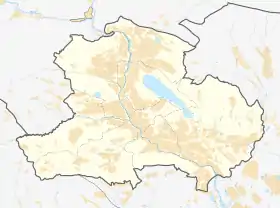| Sultan Ezid Temple | |
|---|---|
 Sultan Ezid temple | |
| Religion | |
| Affiliation | Yazidism |
| Year consecrated | 2015 |
| Location | |
| Location | Tbilisi, Georgia |
 Shown within Tbilisi | |
| Geographic coordinates | 41°42′35″N 44°52′18″E / 41.70972°N 44.87167°E |
| Part of a series on the Yazidi religion Yazidism |
|---|
 |
Sultan Ezid Temple is a Yazidi temple located in Tbilisi, the capital of Georgia.[1]
Architecture
The temple is modeled on the Lalish temple, the holiest Yazidi temple located in Iraq[2] and has a single spire and bare-walled exteriors similar to the Lalish temple.[3] The premises also contain a pyramid-shaped glass building where courses on the Yazidi religion and history, as well as Georgian and Kurdish languages, are taught.[3]
History
The temple was opened in June 2015 and is named after Sultan Ezid, one of the holy men of the Yazidi faith. The temple is constructed on land donated by the Georgian Government in 2009, and the construction project was initiated in 2012 by the House of Yezidis of Georgia and financed by local businessmen.[1][4] At the time of its opening in 2015, it was only the second Yazidi temple outside of Iraq.[3]
Yazidis are one of the ethnic minorities in Georgia, practicing an ancient, monotheistic belief that has similarities to Christianity, Hinduism, Judaism, Sufism and Zoroastrianism along with elements of sun worship.[5][2] Yazidi religion was officially recognized in Georgia only in 2011.[3]
See also
References
- 1 2 Shamoian, Teimuraz (18 June 2015). "Yezidis of Georgia celebrate new temple in Tbilisi". Rudaw.
- 1 2 Cogan, Killian (12 September 2016). "History repeating: Yazidis find haven once more in Caucasus". AlAraby.
- 1 2 3 4 Shehadi, Lemma (15 December 2019). "'Our community was dying out': Yazidis struggle to find an identity in post-Soviet Georgian landscape". Independent. Archived from the original on 2022-05-25.
- ↑ "Georgia: Situation of the Yazidi minority". Journal of Ethnic and Cultural Studies. 29 November 2017. Retrieved 7 November 2020.
- ↑ Sanders, Mija A (August 2019). "Yezidis in ancient India, or Indians in ancient Mesopotamia?: Re-imagining Ancient Yezidi Origins". Journal of Ethnic and Cultural Studies. Retrieved 7 November 2020.